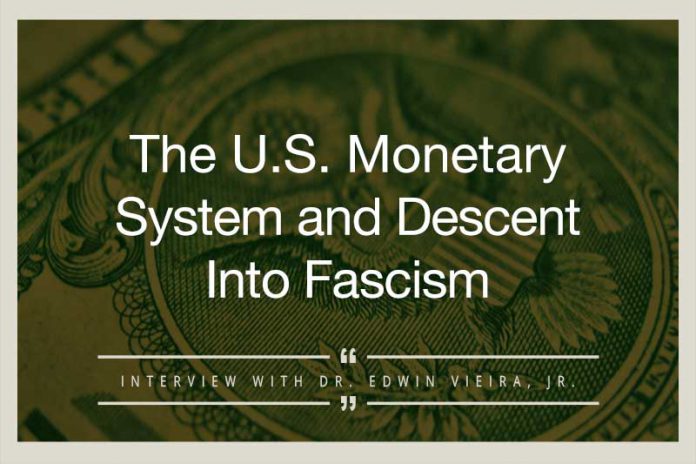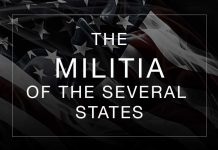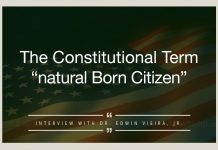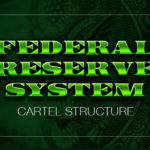Last Updated on September 2, 2022 by Constitutional Militia
The following interview with Dr. Vieira was conducted in early June of 2011 for the subscribers of The Casey Report – but after careful consideration, we decided that the content is so important; it needs to be shared with a wider audience. Feel free to pass it along.
David Galland
Managing Editor
The Casey Report
We first met Dr. Vieira at our Casey Research Boca Raton Summit and were sufficiently impressed to want to hear more, and to share more, of his work with readers of The Casey Report.
DAVID: Before kicking things off, I’d refer readers to Dr. Vieira’s in-depth and excellent paper, “A Cross of Gold,” as that provides a more detailed analysis on how the corrupt U.S. monetary system might transition into something more honest and effective.
Getting started, from a big-picture perspective, technically speaking, is the current U.S. monetary system actually constitutional?
EDWIN: Well, technically speaking, factually speaking, legally speaking, no. In a word, no.
DAVID: Why not?
EDWIN: There are two levels to consider. First, there’s the straight currency level—what is supposed to be the official monetary unit. Then there is “other,” which I distinguish as different from the official monetary unit because the Constitution doesn’t prohibit private parties from creating media of exchange for their own uses, as long as those media of exchange are non-fraudulent and they’re operated in an otherwise honest commercial fashion.
But the official unit of currency is supposed to be the dollar, and I’ll tell you exactly what a dollar is—it’s 371.25 grains of silver in the form of a coin. That was determined as a historical fact in 1792. Actually the dollar was adopted before the Constitution was even written. It was adopted by the Continental Congress under the Articles of Confederation, the so-called Spanish milled dollar, which was the actual unit that was circulating then, because there had been essentially no coinage under the various colonial regimes in colonial America. So that’s the dollar unit.
Well, do we have that now? The answer is, “Well, essentially, no.” First, obviously they are not coining a true dollar, they coin a Liberty Silver Dollar, but that’s 480 grains, not 371.25 grains. And you have various gold coinage with dollar denominations on it, but those dollar denominations have no real relationship in terms of market exchange ratio to a silver unit of 371.25 grains.
So the short answer is that within the coinage system we don’t have what we’re supposed to have. We have silver coins, we have gold coins, but they’re not properly weighted or regulated. And then, of course, we have these base metallic coins, which have no constitutional status at all—at least with respect to being legal tender for their face values. So on the coinage side, we have a mélange and a mess. At least there is some silver and gold coinage, but it doesn’t meet the constitutional requirements.
On the other side, the so-called official paper money side, the Constitution does not provide for official paper money. What it does address are two provisions; the first, dealing with the states, specifically says, “No state shall emit bills of credit.” As a word of explanation, bills of credit were the founding fathers’ terminology for paper currency.
This is interesting because the paper currency they actually used and emitted were bills of credit that promised to pay something, typically gold and silver coins, specified on the face of the bill. So even those types of paper currency, fully redeemable paper currency, were outlawed for the states because the states had emitted them in vast excess. That was the historical basis for the outlawry.
Now, turning our attention to Congress, you need to recall that Congress only has the powers that are granted to it. You don’t look in the Constitution for prohibitions on Congress’s authority and assume that it can do everything that isn’t prohibited. You look for delegations of authority, and you assume that anything that hasn’t been delegated is prohibited.
If you look at the original draft of the Constitution in the Constitutional Convention, the Federal Convention of 1787, it said, “Congress shall have the power to borrow money and emit bills on the credit of the United States.”
That language was taken from the Articles of Confederation. The Congress operating under those articles had the power to borrow money and emit bills—emit paper currency—and they did it. They emitted the so-called continental currency from which came the phrase “not worth a continental” because they emitted so much of it that it depreciated very close to worthlessness.
At the Constitutional Convention, you had people in attendance who had been members of the Continental Congress. They had been members of various state legislatures. These were the leading political figures in the country. They had to a large extent been the ones who had emitted continental currency or had emitted various state bills of credit. So this was a question that wasn’t in some way alien to them as they had been involved in it only a few years earlier.
So the first draft of the Constitution was put forward with the same power that the Continental Congress had, and there was a debate. You look at Madison’s notes, and it was a rather vociferous debate, and they threw out the words “emit bills,” so that now that provision of the Constitution says, “Congress shall have the power to borrow money on the credit of the United States.” It says nothing about emitting bills.
Well, by hypothesis, if the power is proposed and then stricken from the final version, it doesn’t exist, right? You don’t need to be a Harvard law school graduate to understand that.
So we look at those two provisions of the Constitution: One explicitly prohibiting the states from emitting bills of credit, because otherwise the states would retain that power. And the other with respect to Congress, where they didn’t grant the power, even though the power was proposed to be granted and that proposal was overruled, and so it wasn’t granted. Based on that it is clear, I would say, that there is no power in Congress or in the states to issue bills of credit.
What we have now is something I think goes almost beyond the bill of credit, though it’s not really fiat currency because the Federal Reserve note, according to the statute, is supposed to be redeemed in “lawful money.” So in principle one could go back to the Federal Reserve Bank or one could take it to the Treasury – both have the obligation of redemption—and you could exchange a Federal Reserve note for one of these base metallic coins now in circulation. So, I guess it still could be called a bill of credit in the sense that you can actually receive some coinage, but what is the coinage that you receive?
Interestingly, we had an example of this type of problem in the period around the Civil War. During the Civil War and just after, the Union Government issued “greenbacks”—legal tender U.S. Treasury notes—and that was the first time that the government had purported to issue any kind of paper currency under the Constitution.
They did it once again under a wartime emergency—and for a short time, those things were not redeemed because the government was not paying out gold except as interest on bonds. They had to suspend specie payments during the war, but the Supreme Court upheld the constitutionality of that issuance of those greenbacks, I think erroneously, but they upheld it specifically on the basis that the greenbacks were to be redeemed in the constitutional currency of gold and silver.
All right, so even the furthest extent of error that has been made by the judicial system, with respect to paper currency, was premised on that paper currency being a true bill of credit in that it would be redeemed in the constitutional coinage of the country.
Well, if you look at the Federal Reserve note, you have a number of problems with it: Number one, it’s not issued by the Treasury. It’s issued by this banking cartel. No Federal Reserve note can come into existence unless one of the 12 regional banks, each of which is a private corporation, goes to the Board of Governors with certain assets defined in the statute and asks the Board of Governors to generate Federal Reserve notes.
The Board of Governors can’t generate Federal Reserve notes on its own, neither can the Treasury. So these things are being generated by a private corporation, and they’re not redeemable as a matter of law in the official constitutional silver or gold currency of the country. So they probably have four or five constitutional strikes against them. Especially if you look at the difference between U.S. Treasury notes and Federal Reserve notes. Treasury notes were always the product of some specific statute enacted by Congress, where Congress would say that so many millions of dollars’ worth of these notes are to be emitted.
DAVID: Right, and emitting those notes obviously falls within their right to borrow money.
EDWIN: Well, assuming that that’s what they’re doing—and that was the Supreme Court’s decision in the legal tender cases after the Civil War—they said, well, that’s a form of borrowing money. It really isn’t because it’s a form of generating money. You don’t borrow money when you generate money—the concept is nonsense—but even assuming that that’s the case, Congress has the power to borrow money and they specify a certain amount of money.
Well, they haven’t specified a certain amount of money to come out of the Federal Reserve system ever. There’s absolutely no specification—that’s all left to the whim of the Federal Reserve banks. So assuming that Congress had the power to generate Treasury notes, they would do it in a controlled fashion by telling us exactly how much is supposed to come out with each emission. Here they have purported to delegate this power to a consortium of private bankers, so this is like six or seven strikes. This is worse than baseball.
DAVID: And at this point, you really cannot redeem your Federal Reserve notes for anything anywhere. I mean, you can trade them with other people for other goods, and then you can take them to the bank and redeem them in base metal coins worth a fraction of their face value.
EDWIN: Well, initially Federal Reserve notes were required to be redeemed in gold, and then that was removed in ’33 and ’34 with the gold seizure. So now we have notes that, as John Exter used to say, are an IOU-Nothing Currency—because with respect to the banks and with respect to the Treasury, they owe you nothing, and if you go into the marketplace, you may be able to get whatever someone will give you for them, but you have no legal right to demand any particular amount of anything.
A redeemable currency, by law, is a currency that has a requirement that the issuer redeem it in something that is specified, a certain weight of gold, a certain weight of silver, whatever. So at one time, Federal Reserve notes were redeemable currency.
Now, I suppose, as I said, they’re not a fiat currency because you can get this base metallic stuff for them, but the constitutional requirement, assuming that you could have a bill of credit at all, would be that it had to be paid in the constitutional coinage unit. So this is the problem. Constitutionally, the thing is a first-class mess.
DAVID: So you’ve got eight strikes or so against this currency, constitutionally speaking, and yet the situation persists. Why hasn’t there been a successful challenge to the system in the courts?
EDWIN: Looking at challenges that have come up over the years, I would start by looking back to the ’30s, because in the ’30s you had two events. The first was a gold seizure followed by the second, the prohibition of gold clauses in contracts.
You had one set of cases that came up to the Supreme Court dealing with the prohibition of gold clause contracts, and one can only look at those and shake one’s head and say, “Well, this is just, you know, fraud, complete double talk, nonsense.” And interestingly enough, they never took on the gold seizure. They never decided a case on the gold seizure, even though cases were brought to them. They refused to hear them, and I think the reason was even they knew they couldn’t figure out how to justify that one, how to rationalize that.
Subsequently, you’ve had attempts by people to challenge the Federal Open Market Committee in particular, because the Federal Open Market Committee of course is composed not only of the members of the Board of Governors of the Federal Reserve System.
Now, arguably, because they’re appointed by the president and confirmed by the Senate, you could say they’re officials of the government, although that’s an open question that’s never really been decided. But the other members of that committee are representatives of the private Federal Reserve regional banks, about which there have been a number of challenges brought on the ground that you can’t allow private parties to participate in that kind of a committee—a committee that is essentially making governmental monetary policy.
Every one of those challenges has been thrown out without reaching the merits. They’ve been thrown out on some kind of standing ground – either the courts have refused to hear them at all, or they’ve thrown them out on what I would call tangential grounds, really not getting to the merits. I think the ultimate reason for that is probably out of fear or prudence, depending on how you want to characterize it.
I mean, if I’m a judge and somebody comes to me with one of these cases and says, “I want you to overturn this entire monetary structure by knocking out this important provision or that important provision,” I say to myself, “Well, yes, I guess I could do that, legally speaking. I can write an opinion saying that this provision of the law is unconstitutional and it’s no longer effective.”
But then what happens?
I can’t write, in my opinion, an order to Congress to pass a particular statute to correct that situation, so although I can throw a judicial monkey wrench into the gears, I can’t do anything to prevent the disaster that will then occur as a result of blowing up that mechanism. Ergo, wearing the hat of a judge, I’m going to stand back and not get involved but rather leave it to Congress to solve, if possible.
(continued on page 2)




































